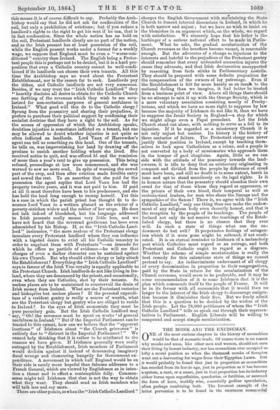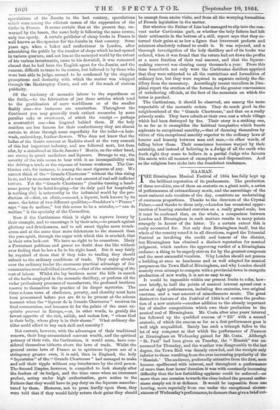THE MONK AND THE EXCISEMAN.
ONE of the most curious chapters in the history of monachism would be that of monastic trade. Of course there is no reason why monks and nuns, like other men and women, should not earn their living by honest industry, nor has monachism ever occupied so lofty a moral position as when the thousand monks of Serapion went out a-harvesting for wages from their 'Egyptian Laura. But it would probably be found that just in proportion as monachism has receded from its heroic age, just in proportion as it has become a system, a cant, or a snare, just in that proportion has its industry either borne upon superfluities, quackeries, or futilities, or assumed the form of keen, worldly wise, essentially godless speculation, often perhaps combining both. The foremost example of the latter perversion is to be found in the enormous commercial
speculations of the 'Jesuits in the last century, speculations which were among the efficient causes of the suppression of the Order in France. It seems certain that at the present day, un- warned by the lesson, the same body is following the same course, only less openly. A certain publisher of cheap books in France is well known as the operator for the Jesuits in that country. Some years ago, when a baker and confectioner in London, after astonishing the public by the number of shops which he had opened in various quarters, and not less so the moneyed world by the extent of his various investments, came to his downfall, it was rumoured abroad that he had been the English agent for the Jesuits, and the rumour, difficult to trace to its source, but believed in by those who were best able to judge, seemed to be confirmed by the singular promptness and dexterity with which the matter was whipped through the Bankruptcy Court, and out of the reach of curious publicity.
Of the tendency of monastic labour to the superfluous or the futile,—to the fabrication of just those articles which tend to the gratification of mere worldliness or of the smaller fleshly sins—the instances are numberless. Throughout the Continent you may generally track extinct nunneries by some peculiar cake or sweetmeat, of which the receipt — perhaps a counterfeit one—has lingered behind them. If the holy maidens are less famous for their confectionery they are almost . certain to shine through some superfluity for the toilet—a hair- wash, embroidery, feather-flowers. Who does not know thut the ladies of the M onte convent at Madeira stand at the very summit of this last important industry, and are followed next, but from afar, by a sisterhood at Rio de Janeiro ? Monks, on the other hand, are strong in quack medicines and liqueurs. Strange to say, the severity of the rule seems to bear with it no incompatibility with the driving a trade at the expense of human weakness. The Car- thusian rule, for instance, is among the most rigorous of any. We cannot think of the " Grande Chartreuse" without the idea rising in us, and by no means untruly, of a vast amount of real self-inflicted torture. Yet the " Grande Chartreuse " (besides turning a hand- some penny by its hotel•keeping—for its duly paid for hospitality is nothing else) is noteworthy in the industrial world by the pro- duction of—first, an elixir,—second, a liqueur, both known by its name, the latter of two different qualities;—Bradshaw's " France " says " eau de melisse," but this seems to be a mistake,—" eau de -nadlisse " is the specialty of the Carmelites.
Now if the Carthusians think it right to reprove luxury by their example, and to encourage it by their acts,—to preach against gluttony and drunkenness, and to sell sweet tipples more treach- erous and at the same time more deleterious to the stomach than the pure spirit, through the sugar with which this is overlaid, that is their own look-out. We have no right to be censorious. Many a Protestant publican and grocer no doubt does the like without ever feeling that he has a lie in his right hand. But it may fairly be required of them that if they take to trading they should submit to the ordinary conditions of trade. They enjoy already over the ordinary trader the enormous practical advantage of live -communism over individual exertion,—that of the minimizing of the cost of labour. Whilst the lay brethren scour the hills in search of the herbs employed in the monastic distillery, or perform all the ruder preliminary processes of manufacture, the professed brethren reserve to themselves the practice of its deeper mysteries. The three solemn vows of obedience, poverty, and chastity must have been pronounced before you are fit to be present at the solemn moment when the "liqueur de la Grande Chartreuse" receives its final consecration, and becomes fit for the palate of the most ex-
• -quisite gourmet in Europe,—or, in other words, to gratify the lowest appetite of the rich, selfish, and useless few, " whose God is their belly, whose glory is in their shame." What ordinary dis- tiller could afford to buy such skill and sanctity?
Not content, however, with the advantages of their traditional renown, their long-accumulated convent wealth, and the spiritual potency of their rule, the Carthusians, it would seem, have con- sidered themselves hitherto above the laws of trade. Whilst the general excise laws of France as to spirituous liquors are of a stringency greater even, it is said, than in England, the holy " liquoristes" of the " Grande Chartreuse" had managed to make and sell their tipple without any interference by the civil power. The Second Empire, however, is compelled to look sharply after the feeders of its budget, and the time came when an irreverent prefect, acting under high authorization, gave notice to the Fathers that they would have to pay duty on the liqueurs manufac- tured by them. However, not to press hardly upon them, they were told that if they would fairly return their gains they should be exempt from excise visits, and from all the worrying formalities of French legislation in the matter.
But whether the Father of Lies had managed to slip into the con- vent under Carthusian garb, or whether the holy fathers had left their arithmetic in the bottom of a still, report says that they re- turned their gains at so low a figure that irreverent prefects and ministers absolutely refused to credit it. It was rejected, and a thorough investigation of the holy distillery and of its books was ordered, when it was found that the return had set down the profits at a mere fraction of their real amount, and that the liqueur- making convent was clearing many thousands a year. From this time henceforth not only were the Carthusian distillers apprized that they were subjected to all the restrictions and formalities of ordinary law, but they were required to separate entirely the dis- tillery from the monastery. Accordingly recent travellers in Dau- phine report the erection of the former, for the greater convenience of unbelieving officials, at the foot of the mountain on which the latter is perched.
The Carthusians, it should be observed, are among the more respectable of the monastic orders. They do much good in the neighbourhood of the " Grande Chartreuse," and that on a really princely scale. They have rebuilt at their own cost a whole village which had been destroyed by fire. Their story is a striking one, in so far as it exemplifies the habitual temptation which besets aspirants to exceptional sanctity,—that of deeming themselves by virtue of this exceptional sanctity superior to the ordinary laws of honour and honesty between man and man,—in other words, of falling below them. Their conscience becomes warped by their saintehip, and instead of believing in a Judge of all the earth who doeth right they come to believe in a partial Judge who favours His saints with all manner of exemptions and dispensations. Aud so the religious hero sinks into the fraudulent tradesman.































 Previous page
Previous page